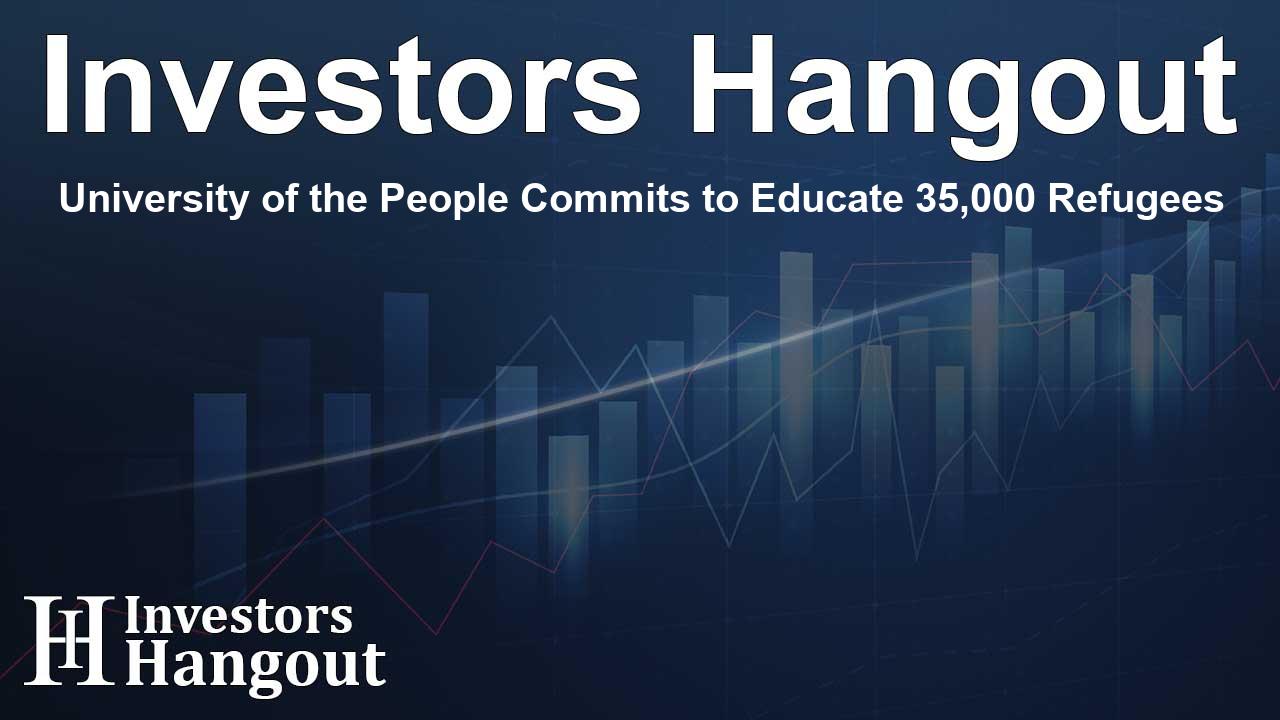University of the People Commits to Educate 35,000 Refugees

University of the People's Ambitious Refugee Education Pledge
Calls on Global Institutions to Support Refugees
As worldwide concerns over the refugee crisis grow, the University of the People (UoPeople) has taken a significant step forward by committing to enroll 35,000 refugees by 2030. This pledge, introduced in light of World Refugee Day, marks an increase from their previous goal of 25,000, underscoring their dedication to supporting displaced individuals seeking higher education.
Supporting the UNHCR's 15by30 Initiative
UoPeople's initiative aligns with the UNHCR's 15by30 Initiative aimed at increasing the number of refugee youth in higher education to 15% by 2030. Currently, only 7% of refugees have access to these opportunities, contrasted with the 42% rate among non-refugees. By participating in this initiative, UoPeople is not just expanding its numbers; it is also helping to change the narrative surrounding refugee education.
Impact of Higher Education on Refugees
According to UoPeople President Shai Reshef, higher education serves as a transformative opportunity for refugees. Reshef emphasizes that education can significantly alter their life circumstances, allowing them to uplift themselves and their communities. This belief propels UoPeople's mission to provide educational access, thus delivering a vital resource for personal and social development.
Encouraging Collaboration Among Universities
Reshef also passionately calls for a collective response from universities across the globe. He challenges all 31,000 universities worldwide to enroll just 15 additional refugee students each. This minor commitment could help significantly reduce the educational gap faced by refugees, demonstrating that every institution holds the potential to contribute towards solving this pressing crisis.
Current Contributions to Global Refugee Education
Currently, UoPeople has successfully enrolled over 18,500 refugees, more than any other university. They offer education to students who have fled conflict and crises from places such as Afghanistan, Ethiopia, Myanmar, Syria, Ukraine, and Yemen. This online university operates a 100% tuition-free model, accommodating 153,000 students from around the world, showcasing how flexible online education can empower those in dire situations.
Universities Can Foster Change
Reshef’s vision extends beyond just enrollment numbers. He strongly believes that providing refugees access to higher education can lead to substantial life changes. This assistance not only transforms individual lives but also cultivates positive developments within communities and economies at large.
UoPeople stands out as the first non-profit, tuition-free, accredited online university in the United States. Its mission is to dismantle barriers inhibiting aspiring learners from accessing higher education. By addressing financial, geographical, and personal challenges, UoPeople opens pathways for talented individuals to pursue their academic dreams.
Voices of Refugees
Mohammed Siraj, a Rohingya refugee from Myanmar currently residing in Bangladesh, expresses the common aspirations shared among all students. He affirms that refugee students possess the same talents and potential as others; they merely need the opportunity to demonstrate their capabilities. Reshef reiterates this sentiment, emphasizing the importance of educational access.
Frequently Asked Questions
What is the main goal of UoPeople's pledge?
The main goal is to enroll 35,000 refugees by 2030, expanding educational access for displaced individuals.
How does UoPeople support refugee education?
UoPeople operates a tuition-free model that allows refugees to participate in higher education online, making it accessible regardless of financial or geographical barriers.
What are the current statistics on refugee access to education?
Currently, only 7% of refugees can access higher education compared to 42% of non-refugees.
What initiative does UoPeople support?
UoPeople supports the UNHCR's 15by30 Initiative, which aims to increase the proportion of refugee youth in higher education to 15% by 2030.
What can other universities do to help?
Reshef calls on universities globally to enroll just 15 additional refugee students to help close the educational gap for these individuals.
About The Author
Contact Riley Hayes privately here. Or send an email with ATTN: Riley Hayes as the subject to contact@investorshangout.com.
About Investors Hangout
Investors Hangout is a leading online stock forum for financial discussion and learning, offering a wide range of free tools and resources. It draws in traders of all levels, who exchange market knowledge, investigate trading tactics, and keep an eye on industry developments in real time. Featuring financial articles, stock message boards, quotes, charts, company profiles, and live news updates. Through cooperative learning and a wealth of informational resources, it helps users from novices creating their first portfolios to experts honing their techniques. Join Investors Hangout today: https://investorshangout.com/
The content of this article is based on factual, publicly available information and does not represent legal, financial, or investment advice. Investors Hangout does not offer financial advice, and the author is not a licensed financial advisor. Consult a qualified advisor before making any financial or investment decisions based on this article. This article should not be considered advice to purchase, sell, or hold any securities or other investments. If any of the material provided here is inaccurate, please contact us for corrections.
